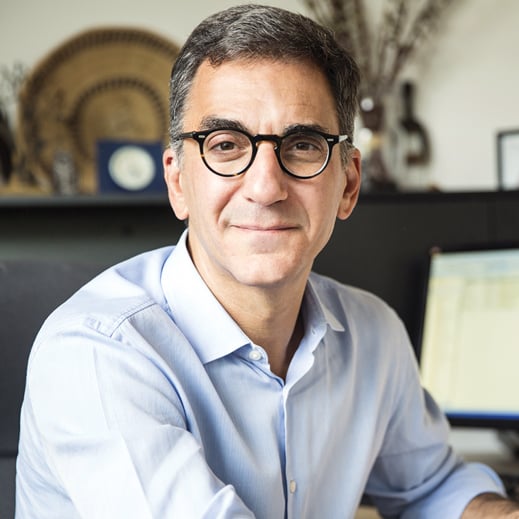For Michael Schlein, the best part of his job is meeting clients—people whose lives are changed with a little boost. Recently, in a modest office building in remote northeast India, Schlein met a woman named Radha Devi, who was applying for a loan to buy a second sewing machine. “She told me the first loan felt like charity, but the second felt like a business transaction,” he says. “She had earned it. She was empowered and proud.”

Schlein is president and CEO of Accion, a nonprofit group providing microloans and other financial services to millions of people living in poverty in 34 countries. His career has taken him through both public service and the private sector.
He earned degrees in economics and political science during five years at MIT, graduating Phi Beta Kappa. After a first job in investment banking, he served as chief of staff to the New York City deputy mayor for finance and economic development and then as chief of staff at the U.S. Securities and Exchange Commission. In 1997 he returned to banking, managing 100 country officers for Citigroup and running communications, philanthropy, and government relations. He first became interested in microfinance through the Citi Foundation’s work with Accion, and he joined the nonprofit in 2009. Under Schlein, Accion has supported a Chilean company that is a pioneer in lending via cell phones and a South African company that brought microinsurance to people with AIDS.
In 2014, he was appointed chair of the New York City Economic Development Corporation, an unpaid position, by a colleague from his days in city government: Mayor Bill de Blasio. “Forty-six percent of people living in New York are at or near the poverty line,” he says. “We want to make sure that the New York City economy works for everyone.” Both Accion and the NYCEDC run on the same kind of practical idealism that drives MIT, Schlein says: “MIT instills in everyone, including me, a real pragmatism that comes from engineering. Lofty ideas have their place, but getting things to happen is what’s really important.”
Schlein lives in Brooklyn with his wife, Jordan Tamagni, who works at Unicef, and their two young sons. He enjoys speaking and recruiting at MIT. “More and more,” he says, “students want to know how to find work combining their desire to have a good career with their interest in making the world a better place.
Keep Reading
Most Popular
Large language models can do jaw-dropping things. But nobody knows exactly why.
And that's a problem. Figuring it out is one of the biggest scientific puzzles of our time and a crucial step towards controlling more powerful future models.
The problem with plug-in hybrids? Their drivers.
Plug-in hybrids are often sold as a transition to EVs, but new data from Europe shows we’re still underestimating the emissions they produce.
Google DeepMind’s new generative model makes Super Mario–like games from scratch
Genie learns how to control games by watching hours and hours of video. It could help train next-gen robots too.
How scientists traced a mysterious covid case back to six toilets
When wastewater surveillance turns into a hunt for a single infected individual, the ethics get tricky.
Stay connected
Get the latest updates from
MIT Technology Review
Discover special offers, top stories, upcoming events, and more.